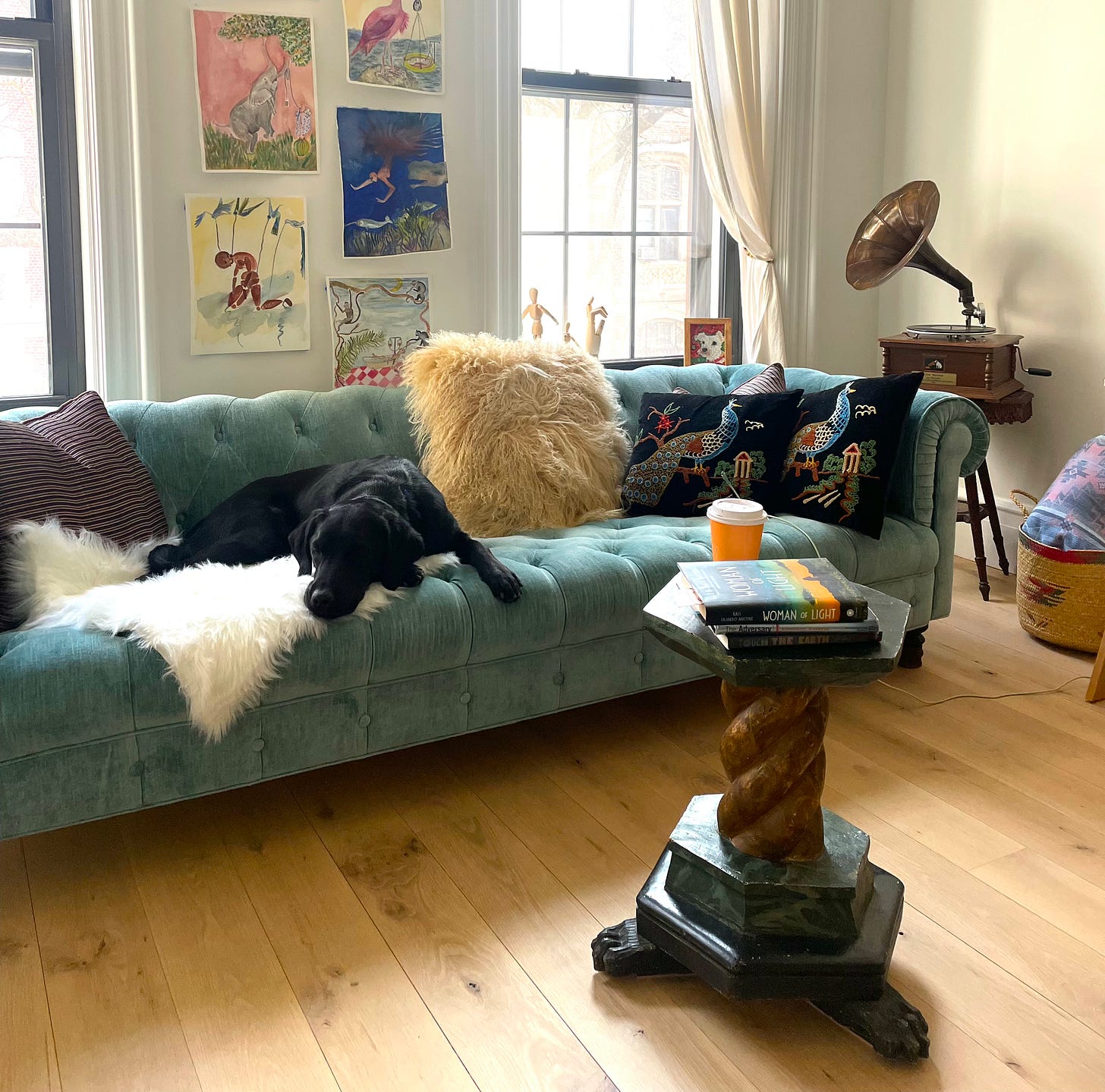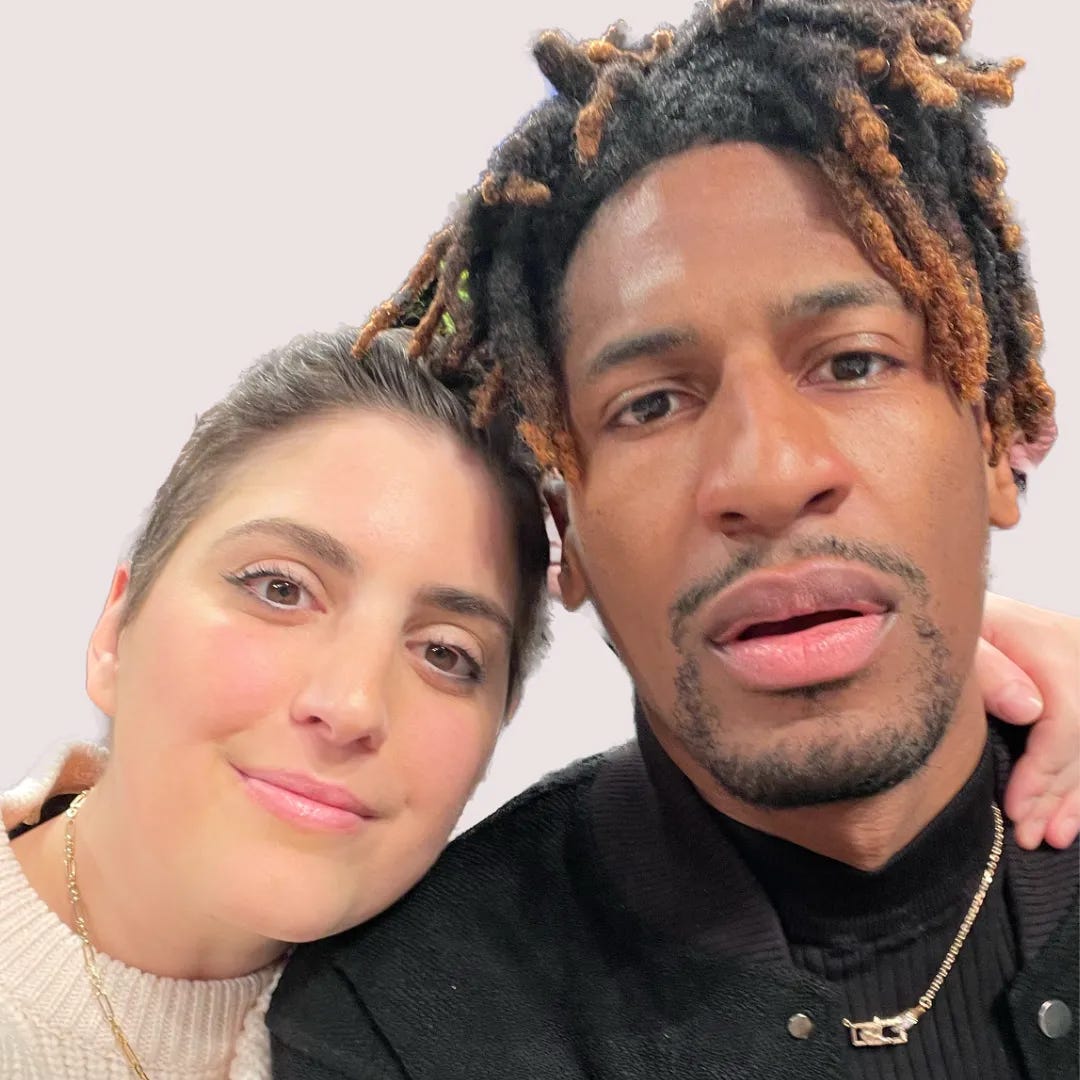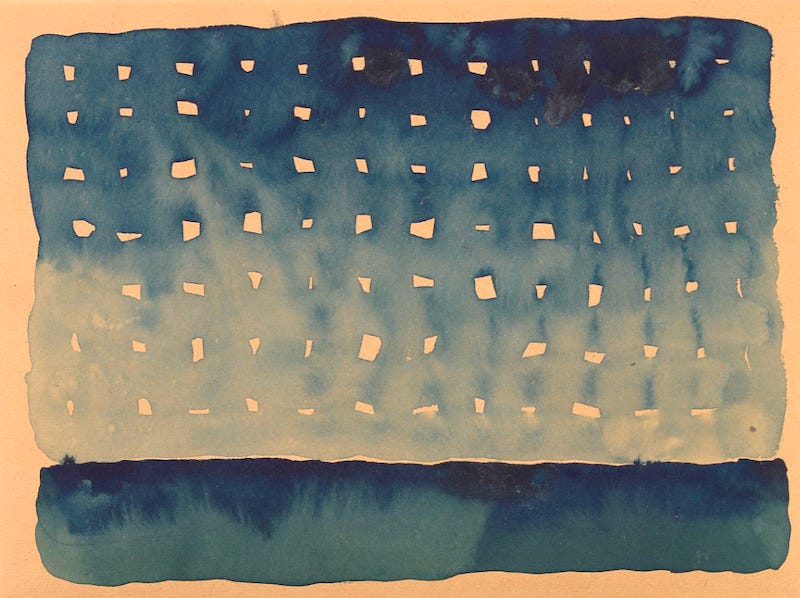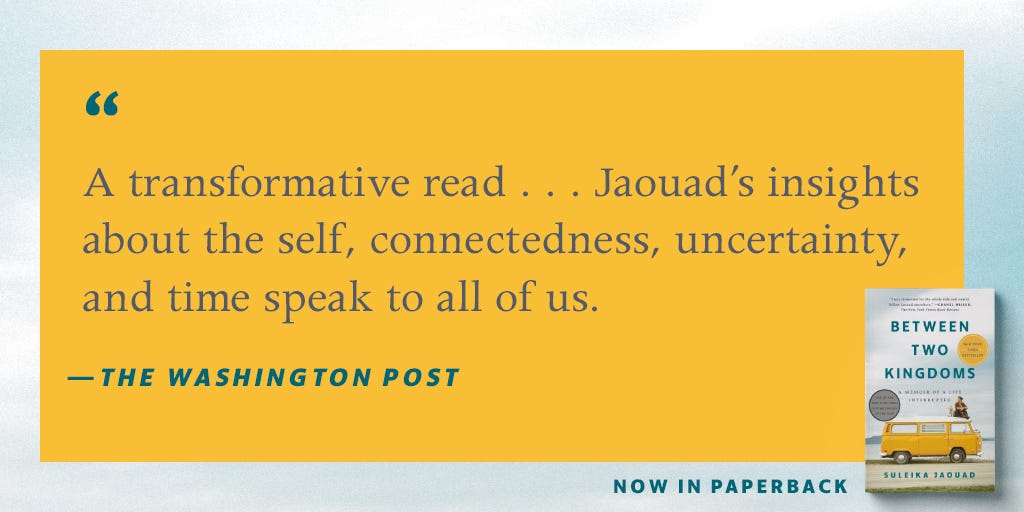Prompt 231. Being Alone, Making Plans, and Not Knowing
& historian Kate Bowler on anti-blessings
Hi friend,
By the time you get this message, I’ll have left for a ten-day writing retreat—something that’s been on the calendar for months but I didn’t believe would actually come to pass. I’ve been waiting for something to happen, like a wracking cough to set in or fever to take hold, but I leave at dawn tomorrow, and my body so far is cooperating. I’m still on an upswing physically, feeling good and energized, like I’m on some pretty rock-and-roll uppers. I keep thinking, Is this what “normal” people feel like? You can take a nice long walk and not spend the rest of the day in bed? Just wild!
So I’m excited and eager and grateful, and at the same time, I feel such trepidation. It’s my first attempt at being independent, my first time traveling anywhere solo since my relapse, without Jon or my parents or friends waiting in the wings (although I do get to bring River, hallelujah). I feel very vulnerable. I’ve been so cocooned, I’ve felt so protected. To make this trip without any of the people I love is frankly terrifying.
In addition to the physical fear of this solo foray is another—about the writing part of this writing retreat. I’ve had an idea for a book of paintings and essays for months, but only had the mental energy to actively consider it in the last couple of weeks. As I begin to sketch it out in my mind, I feel this deep anxiety, rooted in the knowledge that a book is an investment in the future. A book is a multi-year project, and making that kind of long-term commitment feels really scary to me right now—because I don’t know when the ceiling will cave in again.
In my more optimistic moments, I tell myself, “I have done this before. I know how to do this. I know I can do this”—both the work of recovery and rebuilding and writing a book. In some ways, this feels similar to what I felt after my first bone marrow transplant, but the truth is I’m in a different place now. The fact that my leukemia returned after a decade shows how stubborn it is. My prognosis this time around is worse, though what that prognosis actually is, even my doctors don’t know. (What I wouldn’t give to never hear the phrase “flying by the seat of our pants” from someone in a white lab coat ever again.)
So I fear making a commitment to this book, because of the disappointment I’ll feel if I’m not well enough to see it through. I also fear what might come out when I’m writing. I haven’t really written in ages, aside from this newsletter—which honestly feels more like corresponding with a friend. Beginning that process again feels like opening a well and shimmying my way down, and I have no idea how deep it will be, or how dark, or what strange creatures might be lurking there.
Again, I tell myself, “I have done this before. I know how to do this”—but it doesn’t feel like I know how to do this. That’s what I said to my wondrous friend and the brilliant poet Marie Howe, who visited me last Saturday. We were sitting in my studio, and she asked me about how I painted my paintings. “I truly don’t know,” I said, “and I don’t know that I can do it again. And I don’t know that I can write a book again.” I was just vomiting my fears to her, in a way that made me feel really embarrassed. She’s a person I admire, and our human instinct is to want to impress people we admire. But in characteristic Marie form, she replied, “I don’t know how to write a poem. The best place to be is in the space of I don’t know.”
And she’s so right. “I don’t know” is fertile terrain. So often, we believe we should know. We look around at everyone else thinking, “They know,” and we pretend to know, and try to wrench ourselves into knowing. But there’s so much possibility in not knowing. Admitting that we don’t know acknowledges that we’re all here to learn—that we’re all forever students. From there, you can take one step forward. With openness and curiosity, you can notice, you can study, and you can start to find the way.
With that, I’ll move on to today’s prompt contributor—the great Kate Bowler, from whom I’m forever learning. She’s a professor of history at Duke’s school of divinity and a bestselling author many times over—in fact, she has a new book that came out just this week, The Lives We Actually Have: 100 Blessings for Imperfect Days. Just before my relapse, I had the good fortune of going on her podcast, and we became instant friends. Kate is wise and kind, but even more than that, she’s so damn funny, such a pure delight. Read on to see exactly what I mean.
Sending love from the great unknown,
Suleika
In Case You Missed It—
On Valentine’s Day, I sent out a raw, unfiltered heart-to-heart with my beloved husband Jon Batiste about life and the creative process. We were trying something new, and as we tackled the community’s questions, we laughed a lot and let things go off the rails a couple times, as we usually do. I’m more than a little excited about how it came together—and more than that, thrilled with what the community had to say!
There were several times while listening that shivers went up my spine and goosebumps down my arm. Like Jon said during his Grammy acceptance speech, sometimes songs (or books or poems) find you when you need them the most. Like radar. Y’all offered me exactly what I didn’t know I needed. —Lauren
I’m gonna have a nobody-knows-why-I’m-happy smile on my face all day. —Judi
This was a beautiful way to start the day. Your thoughts on creativity are my favorite: “Creativity is mysterious. It has something to do with craft but has more to do with life.” Pure stardust. —Rhonda
Prompt 231. On Anti-Blessings by Kate Bowler
We have days that sparkle, days lit up by fireworks. Nothing can be ordinary because we have stumbled into some kind of magic. An evening that unspools. A day that seems to wait for our decisions. We feel blessed to be, for a split second, at the center of the universe.
And then we have days of undoing. There is an undoing that is pulling apart every plan. We have the creeping sense that nothing can or ever has been right. The future has disappeared over a horizon we can never reach.
I am a historian who studies the language we use for those moments of magic, that deep luck that makes us wonder if it’s divine. It’s the language of blessing. But so often our culture mistakes the language for a kind of shellacked certainty that good things should always happen to good people. So on the days like fireworks, we take to social media and proclaim ourselves #blessed. And on days of gentle or ungentle tragedy, then what can we say?
The ancient meaning of the term blessing can be beautiful and instructive for naming that strange mix of awful and lovely experiences in our lives. A blessing is a form of spoken poetry about the divine. It’s an incredibly positive form of speech, but it’s not simply “reframing.” (We don’t need to say, Oh, nevermind. Tragedy is great! I love it. This is my new mindset practice!) We might use blessing as a kind of act that scholar Stephen Chapman calls “emplacement.” Calling something blessed can let us say: This goes here, that goes there. This is beautiful. This is awful. And all of it can be called true.
I started using that language especially on days when I was getting chemotherapy. There were moments of unspeakable sadness. And there were moments of surprising joy. Like I am sitting in the basement below the basement in a hospital in Atlanta, a place so comprehensively without light that I began to joke with the nurse that someone would have to be a vampire to work here. And then the nurse, every Wednesday, begins to agree. He strokes my vein before taking out the needle. He pretends to shrink from any light outside the door. He asks if I had any "extra” blood he could have for his own purposes. And I realized, oh, this is it. The beautiful and the terrible right up next to each other, each setting each other in relief, is the only way I would notice blessing at all.
Your prompt for the week:
Think of a time when you felt especially unlucky. The opposite of #blessed—the “anti-blessing,” if you will—but then you noticed something beautiful, funny, anything that sparkled. Write about holding the tension of both the deep terrible and the fairy dust feeling.
If you’d like, you can post your response in the comments section, in our Facebook group, or on Instagram by tagging @theisolationjournals.
Today’s contributor—
Kate Bowler, PhD is a New York Times bestselling author, award-winning podcast host, and a professor at Duke University. She studies the cultural stories we tell ourselves about success, suffering, and whether (or not) we’re capable of change. After being unexpectedly diagnosed with Stage IV cancer at age 35, she penned the New York Times bestselling memoirs, Everything Happens for a Reason (and Other Lies I’ve Loved), No Cure For Being Human (and Other Truths I Need to Hear), and her latest book of blessings written with her co-producer, Jessica Richie, The Lives We Actually Have: 100 Blessings for Our Imperfect Days. Kate hosts the Everything Happens podcast where, in warm, insightful, often funny conversations, she talks with people—like our favorite, Suleika Jaouad—about what they’ve learned in difficult times.
For more paid subscriber benefits, see—
A Creative Heart-to-Heart, a conversation with my beloved Jon Batiste where we tackled the community’s questions on life and the creative process
On Seeking Out Joy, a video replay of our Studio Visit with Kate Bowler about avoiding aggressive futurism, right-sizing our fears, and finding joy in difficult times
On Creative Sanctuary, notes from our last meeting of the Hatch, where we conjured sanctuaries for defending our inner, artistic lives from the world















Three Sundays ago, I was going on one of my long walks preparing for the Camino in April. This time, like so many days recently on my walk, I was stopping by the hospital complex, where my daughter in laws beloved dad remains in the progressive care unit, since Thanksgiving, and in another part of the hospital my sister was in rehab after her adrenal function was shut down by immunotherapy. Bring in leukemia treatment still myself, I was feeling pretty sorry for myself when I passed an old African-American Baptist church, and two men were standing outside, leaning up against a car, dressed impeccably for church. As I tramped by with my backpack on one of them looked at me and asked, “how are you doing today?” Not just a chin up kind of “how you doin’” but he asked about today. I said “Fine, thank you” (I heard this week that “FINE” can mean Fears In Need of Expression) So then I walked about ten more steps beyond them before turning around and interrupting them to say “actually I am struggling.” I went on to say, through mounting tears, “in the past 20 months I have been in an existential crisis sandwiched between a spiritual crisis and a couple of other life crises.” These two men, Kenny and Vincent listened, then hugged me close and Vincent prayed in a way that only people who have survived decades of oppression can pray. They invited me to their church any time I need a safe place to just be.
To Sweet, Strong, Suleika...you are Beginner's Mind. My deepest admiration to you and my sparkliest hope for a week filled with wonder, awe, tears when needed, and hopefully laughter. All the rest just "is." Now for me...just yesterday, I held my daughter as she cried tears made of near constant pain, the desire to be "like other 21-year-olds who don't have to deal with all the medications, pain, and the decision to go on a living moment to moment." At that moment (which actually lasted a few hours), I realized that I am strong as hell. I could hold her pain which hurt me to the core, twisted life in my stomach and heart, pulled it out and began again, but I could still "be there" for her, and she could feel my strong presence. As my therapist would say, "That's a big, fuckin' deal!" And it is. I finish by sharing with River and Suleika that your going to the Writer's Retreat is my rainbow of the day.